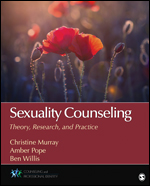Sexuality Counseling
Theory, Research, and Practice
First Edition
Christine E. Murray - University of North Carolina at Greensboro, USA
Amber L. Pope - William & Mary School of Education, USA
Benjamin T. Willis - University of Scranton, USA
Christine E. Murray - University of North Carolina at Greensboro, USA
Amber L. Pope - William & Mary School of Education, USA
Benjamin T. Willis - University of Scranton, USA
368 pages
| January, 2016
| SAGE Publications, Inc
Instant Access!
eBook
ISBN: 9781506350080
Paperback
ISBN: 9781483343723
$115.00
Instant Access!
eBook
ISBN: 9781506350080
“Sexuality Counseling: Theory, Research, and Practice is an important resource for mental health practitioners. Sexuality is complex and rather than attempting to simplify, this book works within that complexity in a well-organized and comprehensive way.”
- Alexandra H. Solomon, Northwestern University
Providing a comprehensive, research- and theory-based approach to sexuality counseling, this accessible and engaging book is grounded in an integrative, multi-level conceptual framework that addresses the various levels at which individuals experience sexuality. At each level (physiological, developmental, psychological, gender identity and sexual orientation, relational, cultural/contextual, and positive sexuality), the authors emphasize practical strategies for assessment and intervention. Interactive features, including case studies, application exercises, ethics discussions, and guided reflection questions, help readers apply and integrate the information as they develop the professional competency needed for effective practice.
- Alexandra H. Solomon, Northwestern University
Providing a comprehensive, research- and theory-based approach to sexuality counseling, this accessible and engaging book is grounded in an integrative, multi-level conceptual framework that addresses the various levels at which individuals experience sexuality. At each level (physiological, developmental, psychological, gender identity and sexual orientation, relational, cultural/contextual, and positive sexuality), the authors emphasize practical strategies for assessment and intervention. Interactive features, including case studies, application exercises, ethics discussions, and guided reflection questions, help readers apply and integrate the information as they develop the professional competency needed for effective practice.
Available formats
ISBN: 9781506350080
eBook
Suggested Retail Price: $44.00
Bookstore Price: $35.20
ISBN: 9781506350080
eBook
Suggested Retail Price: $49.00
Bookstore Price: $39.20
ISBN: 9781506350080
eBook
Suggested Retail Price: $55.00
Bookstore Price: $44.00
ISBN: 9781506350080
eBook
Suggested Retail Price: $79.74
Bookstore Price: $63.79
ISBN: 9781483343723
Paperback
Suggested Retail Price: $115.00
Bookstore Price: $92.00
See what’s new to this edition by selecting the Features tab on this page. Should you need additional information or have questions regarding the HEOA information provided for this title, including what is new to this edition, please email sageheoa@sagepub.com. Please include your name, contact information, and the name of the title for which you would like more information. For information on the HEOA, please go to http://ed.gov/policy/highered/leg/hea08/index.html.
For assistance with your order: Please email us at textsales@sagepub.com or connect with your SAGE representative.
SAGE
2455 Teller Road
Thousand Oaks, CA 91320
www.sagepub.com
Series Editors’ Preface: Introduction to the Series, by Richard Parsons and Naijian Zhang
Acknowledgments
About the Authors
Defining Sexuality
A Comprehensive, Contextual Framework for Understanding Sexuality
Professional Issues in Sexuality Counseling
Professional Competence in Sexuality Counseling
Ethical Considerations for Sexuality Counseling
Interdisciplinary Collaborations for Sexuality Counseling
Overview of the Remainder of This Book
General Assessment Strategies
Dimensions of Assessment in Sexuality Counseling
Physiology
Appendix: Directory of Selected Instruments for Assessing Sexuality
General Guidelines for Sexuality Counseling
Review of Approaches to Sexuality Counseling
Treatment for Specific Sexuality Concerns and Using Unique Treatment Modalities
Treatment Outcomes in Sexuality Counseling
Overview of Physiology and Anatomy Related to Sexual Functioning
Safer Sex Practices
Physical Health Issues
Reproductive Health
Sexuality Across the Life Cycle: An Overview
Sexuality in Childhood
Sexuality in Adolescence
Sexuality in Adulthood
Sexual Decision Making
Sexual Implications of Mental Health Disorders
Substance Abuse and Sexuality
Sexual Dysfunctions
Sexual Trauma
Defining Gender Identity and Affectional/Sexual Orientation
Historical, Societal, and Cultural Context
Traditional Sexual Ideologies
Gender Identity
Lesbian, Gay, and Bisexual Affectional Orientations
Ethical Concerns in Working With LGBTIQQA Clients
The Dynamics of Couple Relationships
Integrating Sexuality Counseling With Couples Counseling
Sexuality Counseling for Specific Relationship Concerns
An Intersectional Approach to Understanding Culture and Sexuality
Religion and Sexuality
Race, Culture, Ethnicity, and Sexuality
Socioeconomic Status and Sexuality
Sexuality and Geographic and Regional Variations
Sexuality and the Media
Counseling Strategies for Addressing Cultural and Contextual Influences on Sexuality
Defining Positive Sexuality
Factors Supporting Positive Sexuality: Revisiting the Contextualized Sexuality Model
Benefits of Positive Sexuality
Counseling Strategies to Help Clients Foster Positive Sexuality
Epilogue: From the Author’s Chair
References
Index
KEY FEATURES:
- Every chapter is comprised of information that is sound, evidence-based, and grounded in current literature to provide readers with the most accurate and up-to-date information.
- Case studies and application exercises throughout the book bring concepts to life and give students an opportunity to apply what they learn to real-world situations.
- A new Contextualized Sexuality Model, which presents a framework for understanding sexuality, helps professors plan their courses.
- The book’s focus on the nature of professional identity, its value to the profession and the professional, and ways to further development of professional identity during professional practice provides students with valuable guidance they can use throughout their careers.

